Key takeaways:
- Freelancing offers flexibility in choosing hours and projects, enhancing personal satisfaction and work-life balance.
- Key skills acquired include programming, effective communication, and project management, which contribute to professional growth.
- Finding a niche is crucial; focusing on specific interests leads to greater job satisfaction and client attraction.
- Setting realistic rates based on experience and value delivered fosters confidence and respect in client relationships.
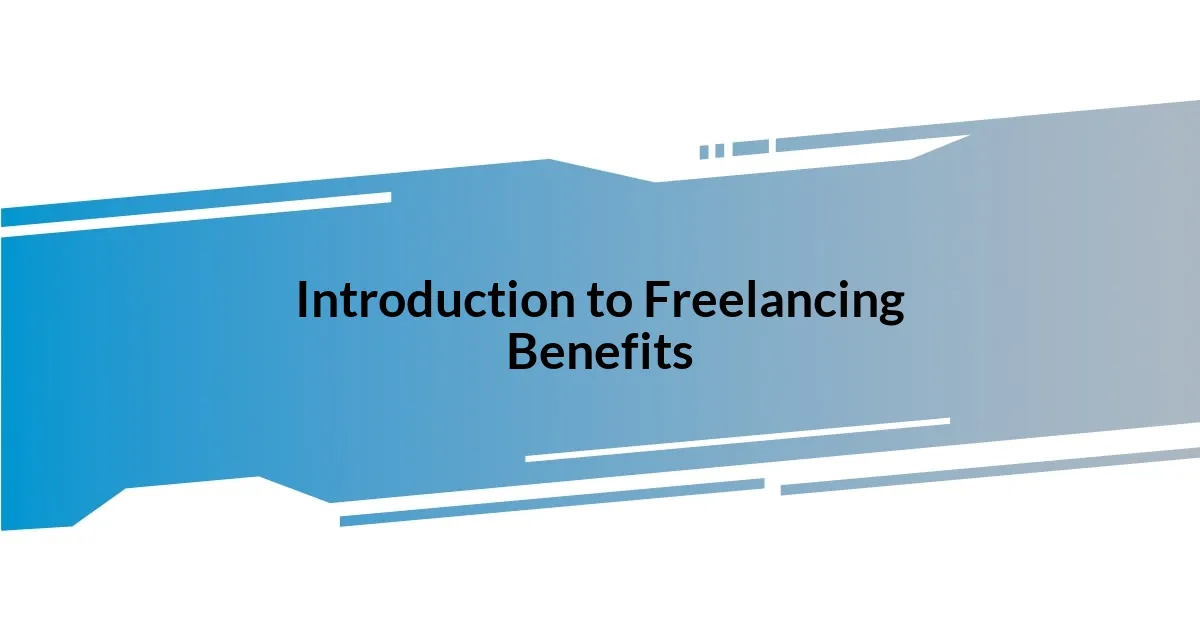
Introduction to Freelancing Benefits
Freelancing in web tech opened up a world of flexibility that I never experienced in a traditional job. Imagine being able to choose your hours and projects—it’s liberating! I remember a time when I had the chance to work on a cool e-commerce site at 2 AM, fueled by late-night inspiration. The joy of crafting in a space and time I loved was unparalleled. Doesn’t the idea of creating your own work schedule sound enticing?
One of the most significant benefits I found was the variety of projects. Each new task felt like an adventurous puzzle. I vividly recall diving into a project that required me to learn a new programming language on the fly. Sure, it was challenging, but the thrill of expanding my skill set and the satisfaction of delivering something new to a client made it all worth it. Have you ever thought about how adapting to new challenges helps you grow?
Financial independence is another powerful aspect of freelancing. While it can be a rollercoaster ride with its ups and downs, the potential for higher earnings is real. I recall the exhilaration of landing my first high-paying project—it felt like a validation of my abilities. That moment illuminated a path to greater financial freedom that I had only dreamed of before. Who wouldn’t want to take charge of their earnings and set their own financial goals?
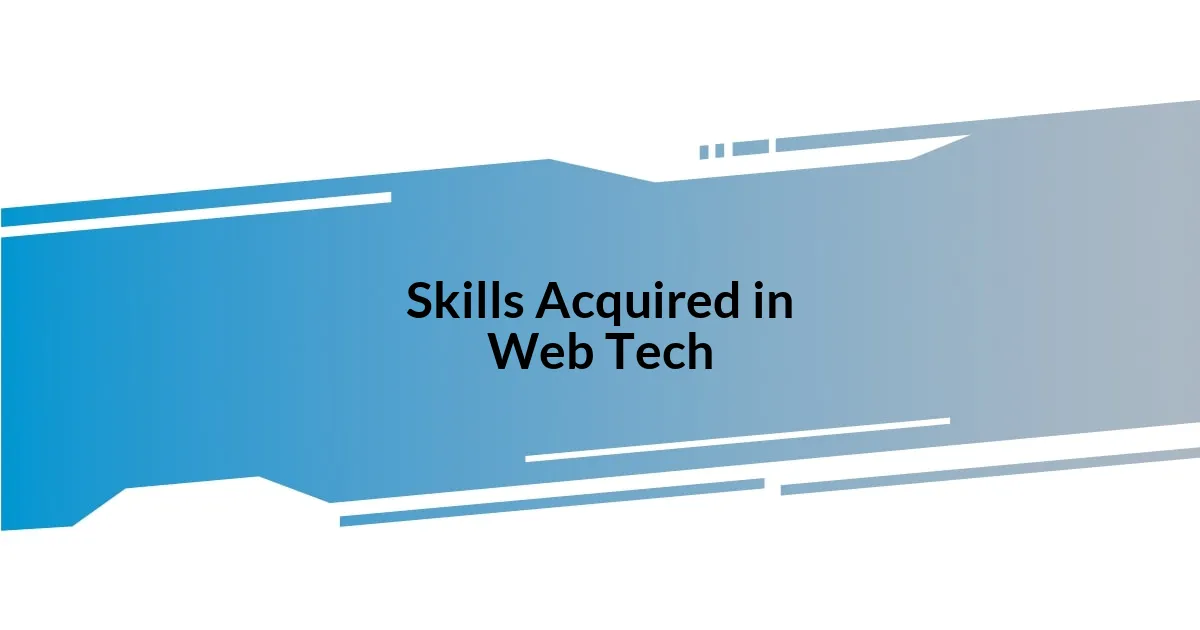
Skills Acquired in Web Tech
Working in web tech as a freelancer taught me a plethora of invaluable skills. I honed my ability to write clean and efficient code, which improved my confidence profoundly. There was one project where I optimized a website’s loading speed by 50%. The rush I felt when seeing that efficiency reflected in user satisfaction was simply exhilarating. Did you ever experience a moment where you realized just how powerful your skills can be?
Moreover, I learned how to communicate effectively with diverse clients. Understanding their vision and translating it into a digital experience required active listening and empathy. I particularly remember collaborating on a project for a local non-profit. Their story struck a chord with me, and I found deep satisfaction in crafting a website that helped them reach a wider audience. The connection we built was as rewarding as the project itself. Have you recognized how communication bridges ideas and brings projects to life?
Project management emerged as a crucially important skill during my freelance journey. I quickly realized the need to juggle multiple projects while meeting deadlines. One time, I had three clients with overlapping needs. My ability to prioritize tasks not only helped me manage my time efficiently but also ensured that I consistently delivered high-quality work. How do you think managing multiple commitments shapes your professional growth?
| Skill | Description |
|---|---|
| Programming | Writing efficient code and learning new languages for diverse projects. |
| Communication | Engaging with clients to understand their needs and convey ideas. |
| Project Management | Juggling multiple projects, prioritizing tasks, and meeting deadlines effectively. |

Finding Your Niche in Freelancing
Finding your niche in freelancing can feel like a monumental task, but it’s also one of the most rewarding aspects of this journey. I remember the early days when I tried to be everything to everyone, taking on various projects that felt misaligned. It wasn’t until I focused on front-end development that I felt truly satisfied. I loved the blend of creativity and functionality—designing interfaces that were both visually appealing and user-friendly. That realization sparked a fire in me, driving me to explore that area deeply.
Here are some tips to help you find your niche:
- Reflect on Your Passions: Think about what excites you. What projects light you up?
- Evaluate Your Skills: Assess your strengths and where you excel. What skills do you possess that are marketable?
- Research Market Needs: Look into industry trends and demands. Where can you fill a gap?
- Experiment: Take on different projects initially. This will help you gauge what you enjoy and where you excel.
- Seek Feedback: Talk to clients and peers about your work; their insights can guide your niche exploration.
Finding that sweet spot not only made my work more enjoyable but also allowed me to attract clients who truly valued my expertise. When I focused on what I loved, everything clicked into place. That’s when I felt the balance between doing what I love and earning a living truly come to fruition.
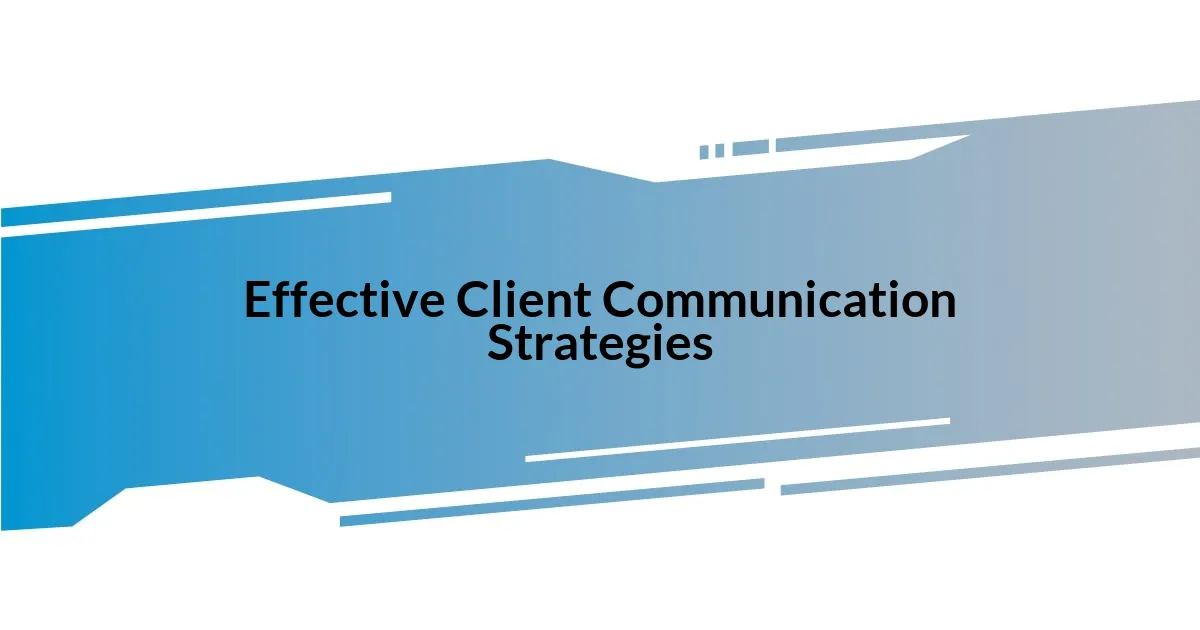
Effective Client Communication Strategies
Effective client communication is like the lifeblood that keeps a project alive. I remember one time when a client came to me with a vague idea. Instead of diving in, I asked specific questions to clarify their vision, and that moment transformed our collaboration. By taking the time to truly understand their needs, I not only delivered a successful project but built a relationship founded on trust and respect. Have you ever noticed how clear communication can turn confusion into clarity?
Utilizing a variety of communication channels has helped me adapt to each client’s preferences. Some prefer detailed emails, while others thrive on quick calls. Early on, I had a client who loved texting—short, on-the-go updates worked wonders for them. This flexibility not only eased the process but also made the client feel valued. How do you approach different communication styles in your collaborations?
Regular check-ins have been pivotal in managing expectations and maintaining momentum. I established a routine of weekly updates with a client on a long-term project, which allowed us to celebrate small wins together. These moments fostered a collaborative atmosphere and kept everyone on the same page. Have you considered how a consistent dialogue can enhance not just your work but also your relationship with clients?
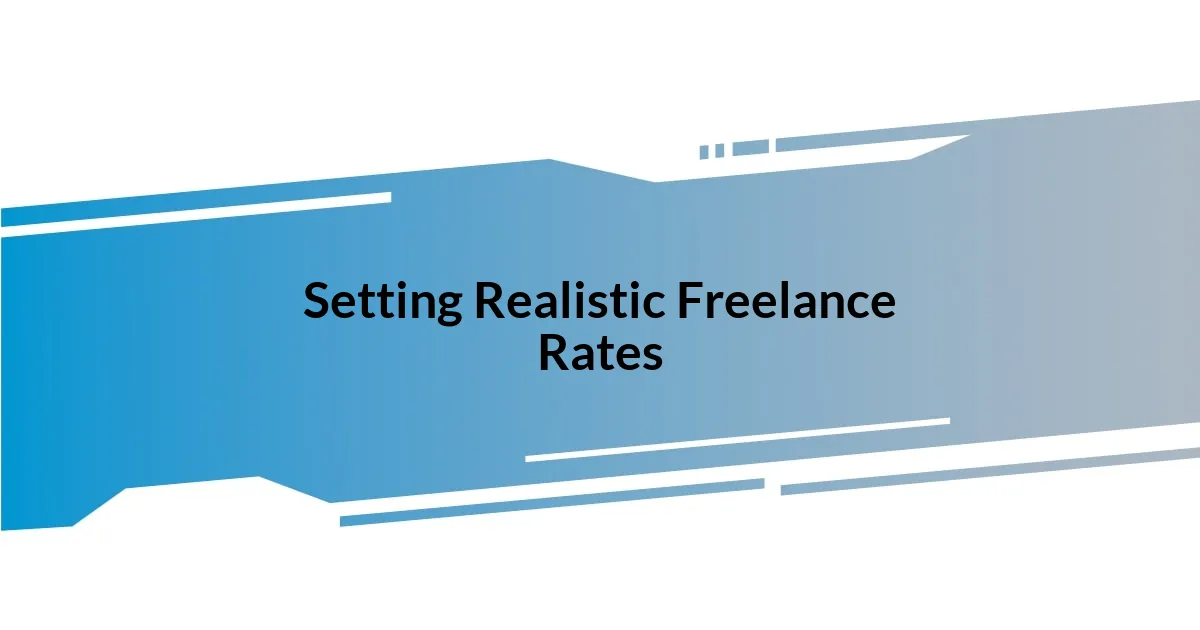
Setting Realistic Freelance Rates
Setting my freelance rates was one of the most challenging yet enlightening experiences of my career. Initially, I made the mistake of undervaluing my skills, fearing that higher rates would scare clients away. I remember one project where I quoted a low price to secure the deal, only to end up overwhelmed and burnt out. Have you ever taken on a project that left you feeling drained? It’s a wake-up call to know that setting realistic rates not only respects your worth but also ensures you maintain the energy and passion for your work.
Researching industry standards proved invaluable for me. I spent time looking at what others in my field with similar skills were charging. One of the best pieces of advice that guided me was to consider not just my expertise but also the value I brought to clients. When I recalibrated my rates based on this perspective, I noticed a shift—clients started to take my work more seriously, and I felt more confident in what I was offering. Isn’t it remarkable how a simple number can influence people’s perception of your value?
Ultimately, I realized that my rates needed to reflect my experience, the time I invested, and the results I delivered. I began to embrace the clarity that came with creating a pricing structure that I believed in. By communicating my process and the value behind my rates, clients understood what they were paying for. Being open about my pricing led to more meaningful conversations about project expectations. Have you thought about how transparent pricing could transform your client relationships?
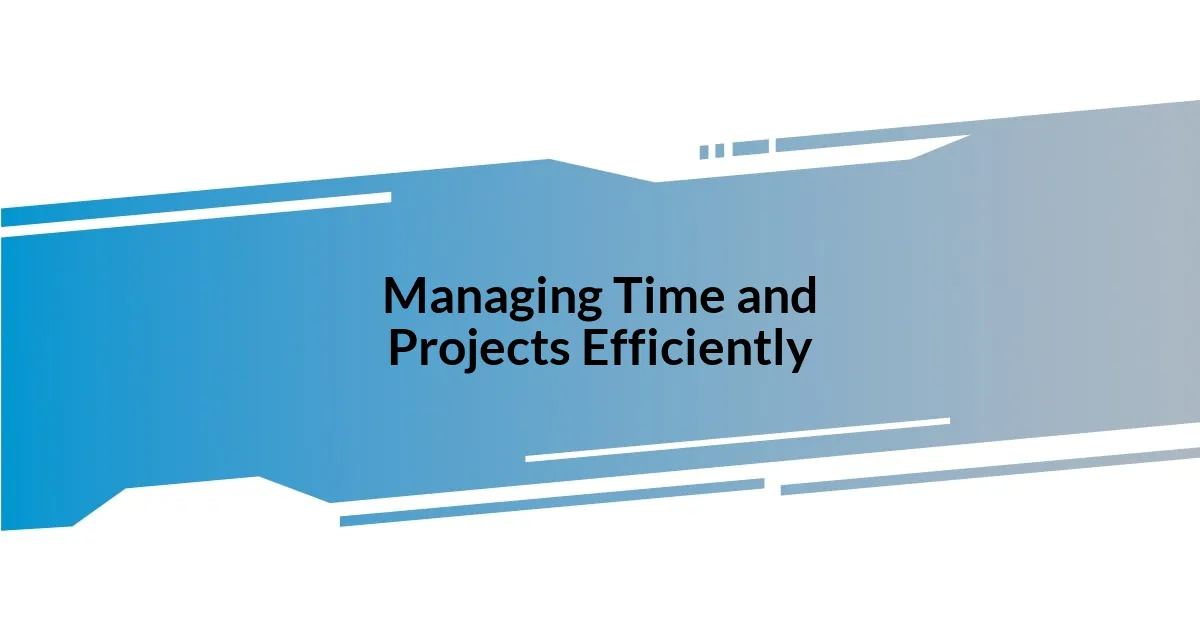
Managing Time and Projects Efficiently
One of the biggest lessons I’ve picked up in managing time and projects is the importance of setting clear priorities. I remember juggling multiple projects and feeling overwhelmed not knowing where to focus my energy. It hit me when I set a priority matrix, defining what tasks were urgent versus important. Suddenly, I could see what needed my immediate attention and what could wait, allowing me to tackle each project with clarity and purpose. Have you ever felt lost in your tasks and wished for a way to cut through the chaos?
In my experience, creating a detailed project timeline has been a game-changer. For a particularly complex web application project, I mapped out all phases, from initial design to final testing, breaking it down into manageable tasks. This made it easier to allocate my time wisely and allowed me to celebrate small milestones along the way. Did you know that having a visual representation of your progress can significantly boost your motivation?
Another effective tactic I’ve embraced is the use of productivity tools like Trello or Asana. I recall a time when I was struggling to keep track of tasks across several clients. By utilizing these tools, I could organize my workload visually and set deadlines that kept me accountable. I’ve found that seeing tasks laid out in front of me not only helps me manage my time better but also reduces anxiety. What tools have you discovered that help you stay on top of your projects?